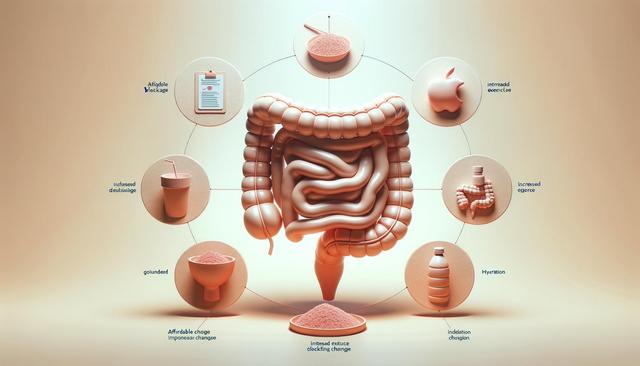Understanding Bowel Blockages and When to Seek Help
A bowel blockage, also known as an intestinal obstruction, occurs when something prevents food or stool from passing through the intestines. It can be caused by factors such as scar tissue, hernias, tumors, or impacted stool. While some partial obstructions can resolve with non-invasive methods, it’s important to recognize when professional medical attention is necessary. Common signs include abdominal pain, bloating, nausea, and inability to pass gas or stool. If symptoms are severe, persistent, or accompanied by fever, vomiting, or significant abdominal swelling, immediate medical care is essential.
Affordable solutions are only advisable for mild or partial cases and should never replace professional diagnosis. Once a healthcare provider has ruled out a complete obstruction or other serious conditions, it may be appropriate to try home-based approaches to improve bowel movement and relieve discomfort.
Hydration and Diet Adjustments
One of the simplest and most cost-effective ways to ease mild bowel blockage symptoms is through proper hydration and dietary changes. Water plays a key role in softening stool and promoting intestinal movement. Adults should aim to consume at least 8 cups of water daily, more if physically active or living in a hot climate. In addition to water, clear broths and herbal teas can help maintain fluid balance and soothe the digestive tract.
Dietary modifications that may support bowel relief include:
- Introducing high-fiber foods gradually (e.g., oats, lentils, flaxseeds)
- Eating cooked vegetables instead of raw to reduce digestive strain
- Avoiding processed foods and red meats that can slow digestion
- Opting for smaller, more frequent meals instead of large portions
These changes can support regular bowel function and reduce the likelihood of future blockages. However, in cases where fiber is not tolerated due to narrowing of the intestines, a low-fiber or liquid diet may be recommended by a healthcare provider.
Gentle Physical Activity and Positioning
Movement can naturally stimulate the digestive system and promote the passage of stool. Low-impact physical activity, such as walking for 20 to 30 minutes a day, is a simple and no-cost approach that may help relieve mild symptoms. Gentle yoga poses, particularly those that involve twisting or abdominal compression, can also encourage intestinal movement.
In addition to exercise, changing body positioning throughout the day may assist with digestion. For example:
- Lying on the left side after eating can support natural intestinal flow
- Using a footstool to elevate the feet while sitting on the toilet may improve bowel mechanics
- Practicing deep belly breathing can relax abdominal muscles and reduce strain
These techniques are accessible and can be integrated easily into daily routines to help manage digestive discomfort.
Over-the-Counter Products and Natural Alternatives
There are several affordable over-the-counter options that may help manage symptoms of constipation-related bowel blockages. These include:
- Osmotic laxatives, which draw water into the intestines to soften stool
- Stool softeners that ease passage without causing cramping
- Suppositories for more direct relief in the lower bowel
For those looking for natural alternatives, some herbal teas—such as senna or peppermint—are traditionally used to support bowel function. However, natural remedies should be used with caution and only after consulting a healthcare provider, especially if other medications or conditions are involved.
It’s important to avoid harsh laxatives or repeated use without medical guidance, as they can sometimes worsen symptoms or create dependency. Always read product labels and follow instructions carefully.
Preventive Measures and Long-Term Management
Preventing future episodes of bowel blockage can help reduce the need for urgent care and improve overall digestive health. Affordable habits that support long-term bowel function include:
- Maintaining a balanced diet rich in natural fiber and fluids
- Incorporating regular exercise into your daily life
- Responding promptly to the urge to have a bowel movement
- Scheduling routine check-ups if you have a history of gastrointestinal issues
For those with recurring symptoms, keeping a food diary may help identify triggers. Avoiding overeating, managing stress, and practicing portion control can also contribute to better digestion. In some cases, healthcare providers may recommend occasional use of fiber supplements or probiotics, which are often available at low cost.
Long-term success in managing bowel health often stems from consistent lifestyle habits rather than quick fixes. These preventive measures are not only affordable but also support broader health benefits beyond digestive comfort.
Conclusion: Supporting Bowel Health the Smart Way
Managing mild bowel blockage symptoms doesn’t have to be expensive. With the right combination of hydration, dietary awareness, physical activity, and careful use of over-the-counter solutions, many people can support their digestive health effectively and affordably. However, it’s always important to monitor symptoms closely and seek medical advice when needed. By taking small, consistent steps, individuals can reduce discomfort and improve their overall well-being without overspending or resorting to drastic measures.


